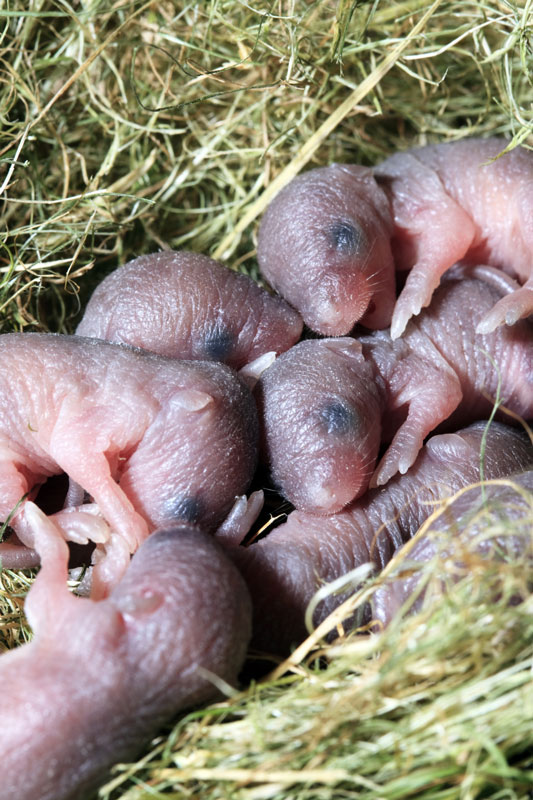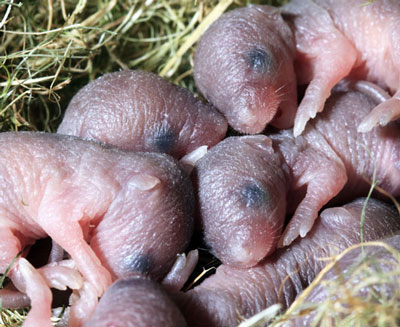Always wash your hands after handling your reptiles and their food.
Always thoroughly wash your hands with soap and water after handling your reptiles and their food. That is just common sense and is also the recommendation of the FDA as a salmonella outbreak that has sickened close to 40 people in 18 states has been traced back to frozen feeder mice used to feed snakes and other reptiles, according to a Food and Drug Administration bulletin posted May 20. The mice are packaged under the brand name Arctic Mice and sold at PetSmart stores, according to the Centers for Disease Control.

Photo by iStock/Thinkstock
Feeder mice come in a variety of sizes. These are called pinkies.
The FDA urges those who have purchased Arctic Mice since January 11, 2014 to dispose of them in a sealed container so no animals can ingest them.
The illnesses were first noticed in January and continued to May 13, with people sickened in Alabama (1), Arizona (2), California (7), Illinois (1), Kentucky (1), Maryland (1), Michigan (2), Minnesota (1), Missouri (2), Montana (3), New Jersey (3), New Mexico (1), North Carolina (1), Ohio (4), Oregon (2), Pennsylvania (3), South Dakota (1) and Texas, according to the FDA.
Read More
PIJAC Sets Feeder Rodent Standards
Salmonella Outbreaks Linked To Undersized Turtles
According to OregonLive, Oregon state and county health officials traced the Salmonella to the frozen mice after determining that the two people who became sick in the state both had snakes and both fed their snake Arctic Mice. Oregon's public health veterinarian asked county health officials to test both patients' remaining feeder mice, which came back positive for the same strain of Salmonella Typhimurium. The FDA tested the facility that packaged the Arctic Mice and found the same strain of Salmonella present.
The FDA has issued a warning to avoid handling any Arctic Mice purchased since January 11 and to discard the mice in a sealed container in the trash can so no animals can get to them.
From the FDA Website:
What Do Consumers Need To Do?
Consumers who have Reptile Industries Inc.’s Arctic Mice brand frozen rodents purchased from PetSmart since January 11, 2014, should dispose of the product by placing it in a sealed container in the trash so that no children, pets, or other animals, such as wildlife, may be able to reach it.
Additionally, consumers who handle feeder rodents should follow these tips to reduce the risk of Salmonella infection:
- DO thoroughly wash your hands with soap and water (for at least 20 seconds) immediately after handling feeder rodents or anything in the area where they are stored, thawed, prepared, and fed to reptiles or amphibians.
- DO thoroughly clean and disinfect all surfaces that come in contact with feeder rodents. A bleach solution of 1 tablespoon bleach to 1 quart (4 cups) water is an effective disinfectant. For a larger supply of solution, add ¼ cup bleach to 1 gallon (16 cups) water.
- DO keep feeder rodents out of areas where food and drinks for people are stored, prepared, served, or eaten.
- DON’T thaw frozen feeder rodents in a microwave oven used for human food.
- DON’T prepare feeder rodents or feed them to your pet reptile or amphibian with kitchen utensils that you use to prepare human food.
- DO designate separate kitchen utensils used solely for these purposes and clean and disinfect them after each use.
- DON’T let children (especially those younger than 5 years), the elderly, and people with weakened immune systems handle or touch feeder rodents, reptiles, or amphibians.
Who Should be Contacted?
Contact your healthcare provider if you have any of the symptoms described above.
The FDA encourages consumers with questions about food safety to call 1-888-SAFEFOOD Monday through Friday between 10 a.m. and 4 p.m. Eastern time, or to consult the fda.gov website: www.fda.gov.
The full bulletin can be read here.



